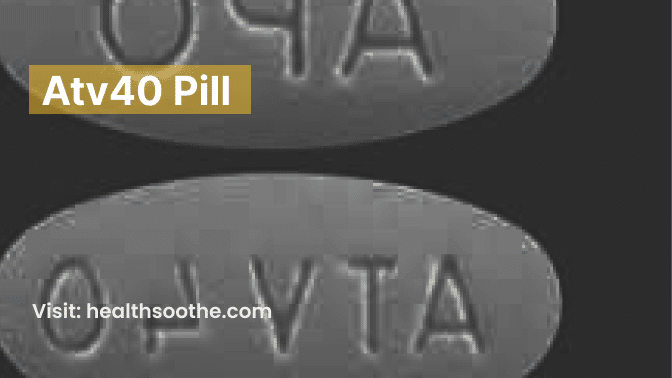ATV 40 pill is a brand name for atorvastatin, a type of medication known as statin. Statins are used to lower cholesterol levels in the blood.
ATV 40 pill is available in strengths of 10 mg, 20 mg, 40 mg, and 80 mg. The dosage of the ATV 40 pill is determined by your doctor based on your individual needs.
ATV 40 pill works by blocking the production of cholesterol in the liver. This helps to lower LDL cholesterol (also known as “bad” cholesterol) and triglycerides, while also raising HDL cholesterol (also known as “good” cholesterol).
ATV 40 pill is used to treat high cholesterol, as well as to reduce the risk of heart attack, stroke, and other cardiovascular events.
It is also sometimes used to treat other conditions, such as familial hypercholesterolemia (FH), a genetic disorder that causes high cholesterol levels.
How does ATV 40 pill work?
ATV 40 pill, also known as atorvastatin, is a statin medication that works by blocking the production of cholesterol in the liver.
Cholesterol is a waxy substance that your body needs to build cells and make hormones. However, too much cholesterol can build up in your blood and increase your risk of heart disease.
ATV 40 pill works by blocking an enzyme called HMG-CoA reductase. This enzyme is responsible for making cholesterol in the liver. When ATV 40 pill blocks this enzyme, it reduces the amount of cholesterol that your liver can make.
This helps to lower LDL cholesterol (also known as “bad” cholesterol) and triglycerides, while also raising HDL cholesterol (also known as “good” cholesterol).
What are the uses of the ATV 40 pill?
ATV 40 pill, also known as atorvastatin, is a statin medication that is used to lower cholesterol levels in the blood. It is also used to reduce the risk of heart attack, stroke, and other cardiovascular events.
Specifically, ATV 40 pill is used for the following:
- High cholesterol: ATV 40 pill is used to lower LDL cholesterol (also known as “bad” cholesterol) and triglycerides, while also raising HDL cholesterol (also known as “good” cholesterol).
- Prevention of heart disease: ATV 40 pill is used to reduce the risk of heart attack, stroke, and other cardiovascular events in people who are at high risk.
- Treatment of familial hypercholesterolemia (FH): FH is a genetic disorder that causes high cholesterol levels. ATV 40 pill is used to treat FH in people who are at high risk of heart disease.
Read Also: Melatonin Round White Pill Uses, Side Effects.
What are the side effects of the ATV 40 pill?
ATV 40 pill, also known as atorvastatin, is a statin medication that is used to lower cholesterol levels in the blood. It is also used to reduce the risk of heart attack, stroke, and other cardiovascular events.
ATV 40 pill is generally well-tolerated, but some side effects may occur. Common side effects include:
- Headache
- Nausea
- Constipation
- Diarrhoea
- Muscle pain
- Fatigue
Serious side effects of the ATV 40 pill are rare, but they can occur. These include:
- Liver damage
- Kidney damage
- Rhabdomyolysis (a breakdown of muscle tissue)
- Myopathy (muscle pain and weakness)
- Pancreatitis
- Diabetes
What are the interactions of ATV 40 pills with other medications?
ATV 40 pill, also known as atorvastatin, can interact with a number of other medications. These interactions can increase the risk of side effects or make the medication less effective.
Some of the most important interactions of the ATV 40 pill include:
- Ciclosporin: Cyclosporine is an immunosuppressant medication that is used to prevent organ rejection after transplantation. Taking ATV 40 pills with ciclosporin can increase the risk of rhabdomyolysis (a breakdown of muscle tissue).
- Gemfibrozil: Gemfibrozil is another medication used to lower cholesterol levels. Taking ATV 40 pills with gemfibrozil can increase the risk of myopathy (muscle pain and weakness).
- Rifampin: Rifampin is an antibiotic that is used to treat tuberculosis. Taking ATV 40 pills with rifampin can decrease the effectiveness of atorvastatin.
- Fusidic acid: Fusidic acid is an antibiotic that is sometimes used to treat skin infections. Taking ATV 40 pills with fusidic acid can increase the risk of rhabdomyolysis.
- Ezetimibe: Ezetimibe is a medication that is used to lower cholesterol levels. Taking ATV 40 pills with ezetimibe can increase the risk of myopathy.
What are the storage instructions for ATV 40 pill?
ATV 40 pill, also known as atorvastatin, should be stored at room temperature away from light and moisture. It should not be stored in the bathroom.
The suspension form of the ATV 40 pill should be stored in the original container and discarded 60 days after opening the bottle, even if there is medication left.
Here are some additional storage instructions for ATV 40 pill:
- Keep ATV 40 pill out of reach of children and pets.
- Do not store ATV 40 pills in direct sunlight or near a heat source.
- Do not store ATV 40 pills in a humid environment.
- If you are not sure how to store ATV 40 pills, talk to your doctor or pharmacist.
Conclusion
the ATV 40 pill is a medication containing the active ingredient Atorvastatin, which belongs to the statin class of drugs. It is primarily used for managing cholesterol levels in the body.
By inhibiting the enzyme HMG-CoA reductase, the ATV 40 pill helps lower LDL cholesterol and triglyceride levels while increasing HDL cholesterol levels.
Proper use of the ATV 40 pill, as prescribed and under the guidance of a healthcare professional, is crucial. It is typically taken orally once daily, with or without food.
Regular medical consultations and follow-up visits are important to monitor the patient’s response to the medication and adjust the dosage if necessary.


